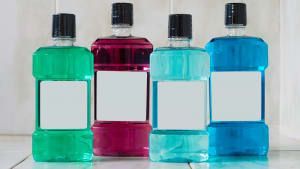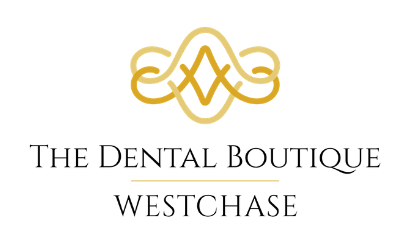Selecting A Mouthwash
November 5, 2021

Maintaining optimal dental hygiene is centered around daily brushing and flossing as well as attending routine examinations throughout the year. But what about mouthwashes? A mouthwash, or oral rinse, is a liquid product used to rinse and clean your mouth, gums, and teeth. These products typically contain antiseptics to kill harmful bacteria that can live in your mouth, between your teeth, and on your tongue.
Adding a mouthwash to your oral care routine can help not only to freshen your breath but also improve the health of your mouth. There are various mouthwashes out on the market so it is important to educate yourself to determine which is right for you and your oral care routine.
As stated above, using the right mouthwash can support your overall dental health to keep your smile radiant. Just like floss, mouthwash is capable of reaching areas of your mouth that your toothbrush cannot. When used correctly, certain mouthwashes can lower the accumulation of plaque on teeth which reduces your risk of developing tartar, cavities, and gum disease. This is accomplished by the active ingredients within the oral rinse.
Though the ingredients may vary from product to product, generally mouthwashes contain antiseptic ingredients such as alcohol, menthol, or cetylpyridinium chloride to eliminate bacteria. When swished around in your mouth, the filmy bacteria that forms plaque is removed while other additive ingredients like fluoride are absorbed into your enamel to strengthen your teeth making them more durable and plaque resistant.
When selecting your mouthwash , consider your personal oral health goals. Are you wanting to tackle bad breath? Or is plaque and gum disease more your concern? There are two main types of mouthwash: therapeutic and cosmetic.
Antibacterial mouthwashes are beneficial for patients with gingivitis, or the early stage of gum disease, and reduce your risk of tooth decay by combatting the accumulation of plaque on teeth. Mouthwashes that contain fluoride work to protect your teeth from the harmful acid produced by bacterial plaque. The fluoride is absorbed into your teeth to strengthen your enamel making them more resistant to acid and protecting against tooth decay and cavities. We recommend patients speak with their dentist before purchasing a fluoride mouthwash as excessive intake, especially in children, can damage your teeth.
There are even mouthwashes on the market for patients who wish to reduce their tooth sensitivity. These products contain active ingredients that desensitize the nerves within your teeth to protect them from sensitivity triggers.
Alcohol can be found in many rinses on the market. However, if you have young children or are wanting to avoid products containing alcohol, there are a variety of alcohol-free mouthwashes that are just as effective and gentle on your teeth and gums.
Though some people only use mouthwash in a pinch to freshen their breath, others include it as part of their daily routine. Whether you use it daily or just for special occasions, here our recommendations to ensure you maximize the benefits of your mouthwash:
If you are curious about adding a mouthwash to your daily routine, ask your dentist about which would be right for you. Mouthwash can be used to help with various conditions such as bad breath, tooth decay, dry mouth, tooth sensitivity, gum disease, and discolored teeth just to name a few. For more information on mouthwash or to schedule a consultation, contact The Dental Boutique Westchase today.
Adding a mouthwash to your oral care routine can help not only to freshen your breath but also improve the health of your mouth. There are various mouthwashes out on the market so it is important to educate yourself to determine which is right for you and your oral care routine.
WHY SHOULD I USE A MOUTHWASH?
As stated above, using the right mouthwash can support your overall dental health to keep your smile radiant. Just like floss, mouthwash is capable of reaching areas of your mouth that your toothbrush cannot. When used correctly, certain mouthwashes can lower the accumulation of plaque on teeth which reduces your risk of developing tartar, cavities, and gum disease. This is accomplished by the active ingredients within the oral rinse.Though the ingredients may vary from product to product, generally mouthwashes contain antiseptic ingredients such as alcohol, menthol, or cetylpyridinium chloride to eliminate bacteria. When swished around in your mouth, the filmy bacteria that forms plaque is removed while other additive ingredients like fluoride are absorbed into your enamel to strengthen your teeth making them more durable and plaque resistant.
TYPES OF MOUTHWASH
When selecting your mouthwash , consider your personal oral health goals. Are you wanting to tackle bad breath? Or is plaque and gum disease more your concern? There are two main types of mouthwash: therapeutic and cosmetic.
- Therapeutic mouthwashes are formulated with medicinal ingredients to improve your oral health in some way by lowering bacterial build-up to help reduce your risk of gum disease, dry mouth, and tooth decay. These are available over the counter and by prescription from your dentist.
- Cosmetic mouthwashes are designed specifically to control bad breath and leave a pleasant taste in your mouth afterward.
Antibacterial mouthwashes are beneficial for patients with gingivitis, or the early stage of gum disease, and reduce your risk of tooth decay by combatting the accumulation of plaque on teeth. Mouthwashes that contain fluoride work to protect your teeth from the harmful acid produced by bacterial plaque. The fluoride is absorbed into your teeth to strengthen your enamel making them more resistant to acid and protecting against tooth decay and cavities. We recommend patients speak with their dentist before purchasing a fluoride mouthwash as excessive intake, especially in children, can damage your teeth.
There are even mouthwashes on the market for patients who wish to reduce their tooth sensitivity. These products contain active ingredients that desensitize the nerves within your teeth to protect them from sensitivity triggers.
Alcohol can be found in many rinses on the market. However, if you have young children or are wanting to avoid products containing alcohol, there are a variety of alcohol-free mouthwashes that are just as effective and gentle on your teeth and gums.
HOW OFTEN SHOULD I USE MOUTHWASH?
- It is best to use mouthwash after you have thoroughly cleaned your mouth by brushing and flossing.
- Pour the recommended amount into the provided cup or as directed on the label.
- Swish the liquid vigorously in your mouth for at least 30 seconds.
- Don’t swallow, but instead, spit the solution out into the sink.
If you are curious about adding a mouthwash to your daily routine, ask your dentist about which would be right for you. Mouthwash can be used to help with various conditions such as bad breath, tooth decay, dry mouth, tooth sensitivity, gum disease, and discolored teeth just to name a few. For more information on mouthwash or to schedule a consultation, contact The Dental Boutique Westchase today.
Share This Post


